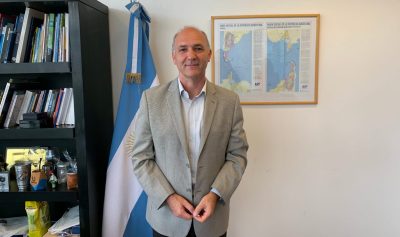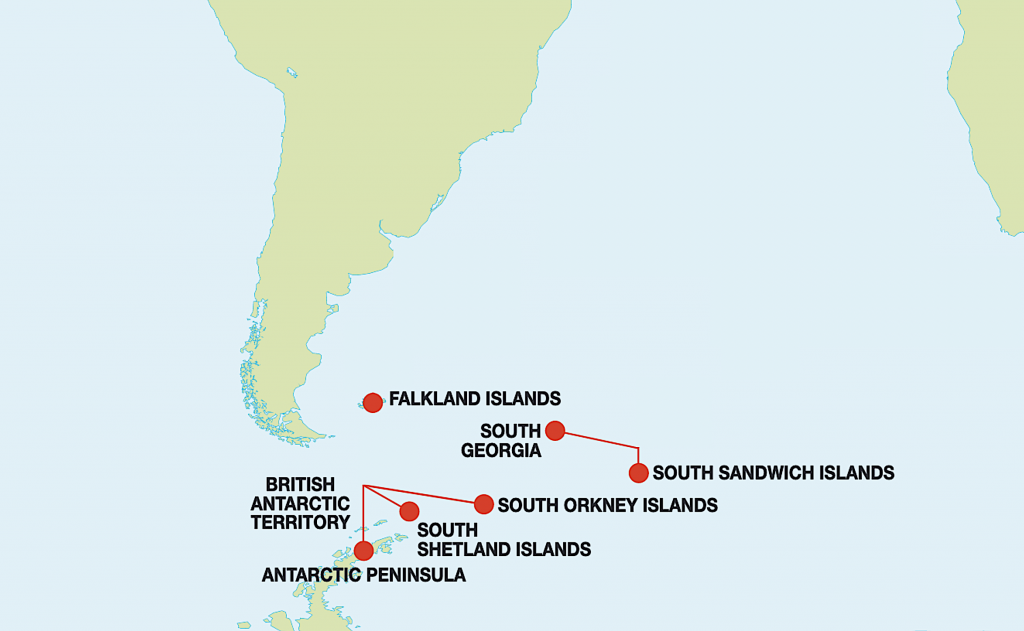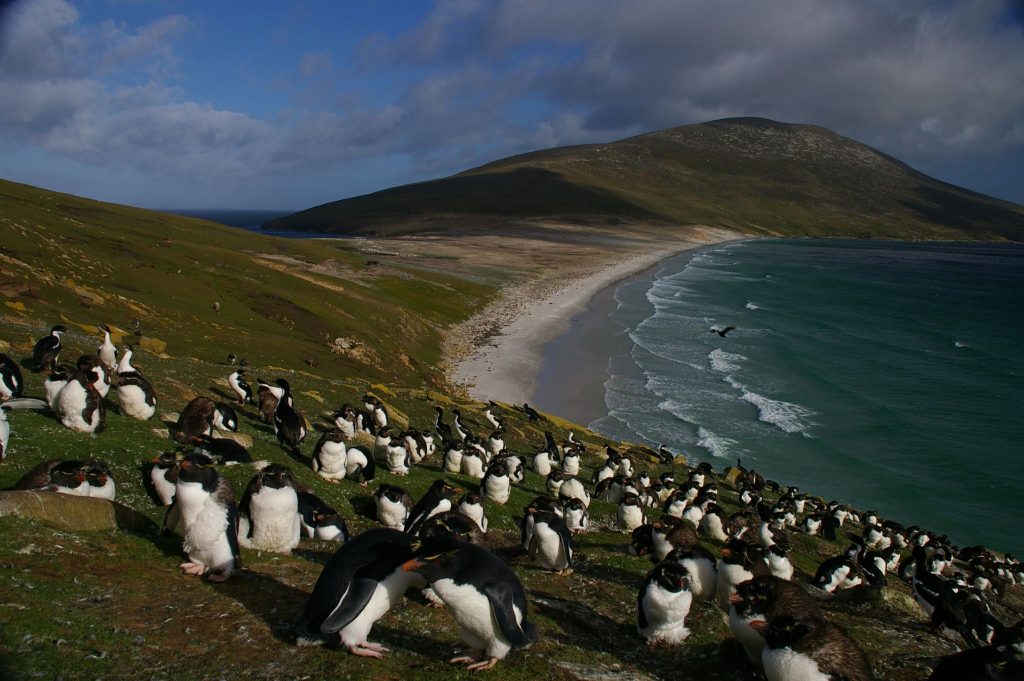Argentine Minister: ‘We can’t be sure there aren’t nuclear weapons in the Falklands.’

All Global Research articles can be read in 51 languages by activating the “Translate Website” drop down menu on the top banner of our home page (Desktop version).
To receive Global Research’s Daily Newsletter (selected articles), click here.
Visit and follow us on Instagram, Twitter and Facebook. Feel free to repost and share widely Global Research articles.
***
On the 40th anniversary of the Falklands War, Declassified sits down with Argentina’s minister responsible for the disputed islands at his office inside the Foreign Ministry in Buenos Aires.
“Let me be very clear,” Guillermo Carmona says, pointing at a map of the South Atlantic sea hanging on his wall. “Las Malvinas, Sandwich and Georgia islands…these are Argentinian, they are occupied by a foreign power.”
The foreign power he is talking about is Britain.
Carmona, Argentina’s minister responsible for the South Atlantic, is talking from his office at the top of the Foreign Ministry in Buenos Aires. The floor-to-ceiling windows give panoramic views of the attractive city dubbed the Paris of South America.
The offices are a stone’s throw from the Casa Rosada (Pink House), the palatial presidential mansion from which Eva “Evita” Peron famously spoke from the balcony.
Carmona is speaking exclusively to Declassified as Argentina and Britain mark the 40th anniversary of the war over the Falklands in 1982 (in Argentina the islands are called “las Malvinas”).
“We don’t say that they will be Argentine someday,” he continues. “Ever since Argentina existed as an independent state, these territories were always claimed as Argentina.”

A map of British Overseas Territories in the South Atlantic claimed by Argentina. (Photo: UK government)
Nuclear weapons
Carmona found out about Declassified after we discovered a document at the National Archives in January showing that the UK had deployed 31 nuclear weapons to the South Atlantic during the 1982 war.
In the aftermath, the Argentine Foreign Ministry released a statement saying it was planning “to raise this situation before the relevant international organisations”.
“Your publication about the nuclear weapons in the Malvinas war was very important for us,” Carmona tells me. “The files are not recent, they were published during the Macri days, and it’s remarkable how the diplomats in London did not take note of the declassification.”
Mauricio Macri, a right-wing businessman, was president from 2015-19 and oversaw an improvement in relations with Britain (Carmona contends this is mainly because he eased Argentine opposition to UK sovereignty in the South Atlantic).
Carmona adds that Declassified’s discovery was “very serious, it confirmed what we have known since 2003” when the UK Ministry of Defence first admitted it had brought nuclear weapons to the 1982 war.
“But from Declassified we learnt of the amazing number of weapons that were brought,” he says. “This confirms how untransparent and lacking in good faith UK actions after the war were.”
Carmona continues:
“It also shows the lack of transparency currently. We can’t be sure that there are no nuclear weapons in the Malvinas now. The UK hasn’t been transparent.” He pauses.
“If something like that happened during the war how can we assume it didn’t happen after the war, especially considering the militarisation process, which is ongoing?”
Strategy
Forty years on from the Falklands war, the UK still refuses to negotiate with Argentina as it is obliged to do by the UN. In the face of this intransigence on the British side, how does Carmona hope to make a breakthrough on the issue?
Carmona tells me there are four planks to his strategy.
“The first is persisting with the claim of sovereignty with the UK. The second is to keep gathering international support. We are not only protected by international law and history, but also almost all countries worldwide stand by Argentina in its claim for abiding by international law.”
He adds:
“Thirdly Argentina, in areas that are not under dispute with the UK, needs to effectively exercise sovereignty. For example, in our sea, we are fighting illegal fishing with policies for the preservation of maritime environments, developing hydrocarbon and mining resources in a sustainable way, and strengthening our Antarctic logistics. That is showing that we care for what belongs to us.”
The first three strategies rely on Argentina. But, Carmona says, the last one doesn’t.
“That is to make the most of any opportunities the international scenario can provide. I always use two examples in this respect. Panama did those three things I mentioned persistently, and when there was an opening, a window of opening with Carter, it was ready to take the opportunity.”
In 1977, President Jimmy Carter signed the Panama Canal Treaty, which ceded US control of the canal beginning in 2000 and guaranteed the neutrality of the waterway thereafter.
Carmona continues:
“Something similar is what happened with China with Hong Kong, which persisted in showing it exercises sovereignty, garnered international support and… the end of the Cold War was the window and opportunity which they grabbed.”
Carmona takes time to think through his methodical answers. He comes across as an unusually serious politician, well drilled on the minutiae of his brief and not prone to grandstanding.

Penguins on the Falkland Islands. (Photo: Creative Commons)
‘Second class citizens’
The population living on the Falklands voted overwhelmingly to remain part of the UK in 2013. How would Carmona assure them that Argentinian rule would protect them?
“We have to bear in mind that the islanders, the people living on the islands, have been very badly treated by UK governments for a long time,” he says. “As sort of second-class citizens, and this is very clear when you analyse the history of the families living on the islands since the occupation in 1833 [the year the islands were formally annexed by Britain].”
But, Carmona says, this poor treatment continues up to the present.
“The UK government did nothing about those who were locked down on the islands during the pandemic. There are residents especially of Chilean origin who for the last two years haven’t been able to go back to where they are from, because the UK lacked the commitment to finding a solution.”
Carmona adds that
“Argentina is committed to respect the interests of the people on the Islands…any islander born on the islands will be considered an Argentine citizen.”
The British position, however, is clear: “The people of the Falklands are British and have chosen to be so. They have the right to self-determination as set out in the UN Charter.”
But Carmona says “within the UN scope this self determination right is not applicable because there is a pre-existing colonial situation.”
He adds:
“We should not lose track of the fact that the population in the islands, though its composition has changed in time, were planted in Malvinas in 1833 after a military invasion, which displaced the Argentine authorities and also displaced the inhabitants.”
“That’s why when we look at the inhabitants’ issue in Malvinas it is sort of similar with the Chagos case where the original population was displaced by a military UK action,” he adds.
The UK forcibly depopulated the Chagos Islands in the Indian Ocean in the 1960s, in order to establish a military base there.
‘Totally anachronistic’
Carmona concludes:
“I am absolutely sure that if we moved on in the negotiations over sovereignty the islanders would have a better life.” But he admits “it is pretty clear the UK is reluctant to go back to the negotiating table.”
According to Carmona
“there was a period of time from 1965 to 1982 when there were negotiations, there was dialogue and talks. This was a fruitful period of time in the relationship between both countries.”
Shortly before the 1982 war, the UK had announced that negotiations would be frozen for a ten year period.
“It’s been 40 years since then, not ten as they announced,” Carmona tells me. “So we believe it’s about time to go back to talking, to honour the UN General Assembly resolutions.”
“The UK’s reluctance stems from them comparing the Argentine democratic governments with the military regimes,” he adds. “Next year will be 40 years of democracy in Argentina. We believe Argentina deserves different treatment by the UK government.”
I finish by asking if Carmona has a message to the British people. He gives a wry smile then says,
“Colonisation was typical of the days of the British Empire, but now it’s totally anachronistic. Maintaining that anachronism has costs for the reputation of the UK government and the UK in general. It also has costs for British taxpayers.”
He pauses before continuing:
“In the 21st century, our expectation is to do away with these colonial situations, which were typical of a world defined by the empire. Global Britain, as proposed by the Conservative UK government, moves us all back in time.”
*
Note to readers: Please click the share buttons above or below. Follow us on Instagram, Twitter and Facebook. Feel free to repost and share widely Global Research articles.
Matt Kennard is chief investigator at Declassified UK. He was a fellow and then director at the Centre for Investigative Journalism in London. Follow him on Twitter @kennardmatt
Featured image: Guillermo Carmona, Argentina’s minister for the Malvinas (Falklands), Antarctic and South Atlantic. (Photo: Matt Kennard/DCUK)

